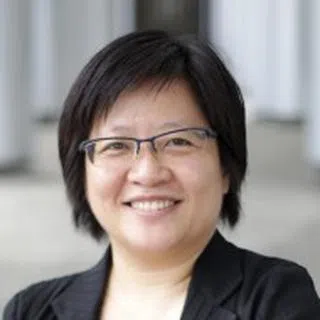Vietnam's firm but flexible balancing act between China and US
Evidently caught between the two major powers, Vietnam has shown adept skill at diplomacy in recent years, along with its soft handling of China and the US, allowing Vietnam to benefit from both sides even amid geopolitical conflict. Lianhe Zaobao associate editor Han Yong Hong takes us through how Vietnam uses "bamboo diplomacy" to develop and reassure its diplomatic relations.
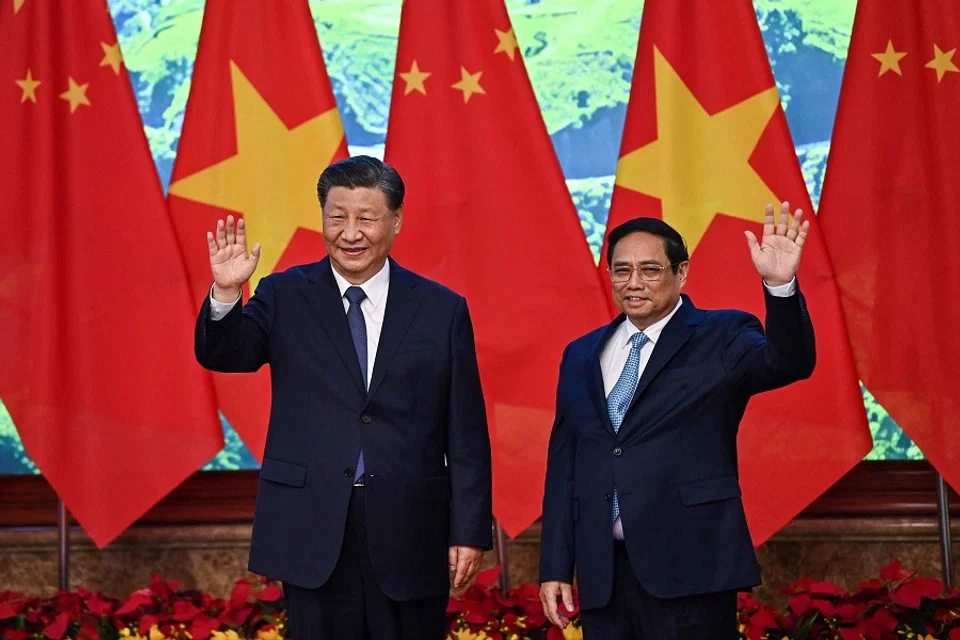
US President Joe Biden's visit to Vietnam in September raised bilateral relations to the highest level of "comprehensive strategic partnership". Three months later, China's President Xi Jinping visited Vietnam, during which bilateral relations were elevated to a level even higher than "comprehensive strategic partnership".
Nuanced differences
For China, Xi's Vietnam visit was deemed highly successful. China and Vietnam signed 36 cooperation agreements and issued a joint statement emphasising that both sides will proactively handle differences over maritime issues. The two countries also deepened ties, elevating relations from the 2008 comprehensive strategic cooperative partnership to a "community of common destiny that carries strategic significance" (具有战略意义的中越命运共同体).
However, there were clear differences in word choice in the China-Vietnam joint statement. In the English and Vietnamese versions issued by Vietnam, as well as the Chinese version found on the Vietnamese government website, the phrase "Vietnam-China community with a shared future that carries strategic significance" (构建具有战略意义的越中共享未来共同体) was used, instead of "community of common destiny".
Simply put, China elevated China-Vietnam relations to a "community of common destiny", echoing Xi's 2013 proposed concept of community of common destiny. However, Vietnam's word choice of "community with a shared future" is of lesser significance and lower level.
Closer research reveals that reports by Vietnamese media were also inconsistent. For example, Vietnamese media outlet Nhan Dan's reporting of the China-Vietnam joint statement used the phrase "community of common destiny", in the same vein as China. But the English translation of the statement from the same media outlet used the phrase "community with a shared future", including in an article attributed to Xi Jinping carried by the paper.
Such a nuance aptly reflects Vietnam's increasingly adept skill at diplomacy in recent years, and its soft handling of China and the US, allowing Vietnam to benefit from both sides even amid geopolitical conflict.
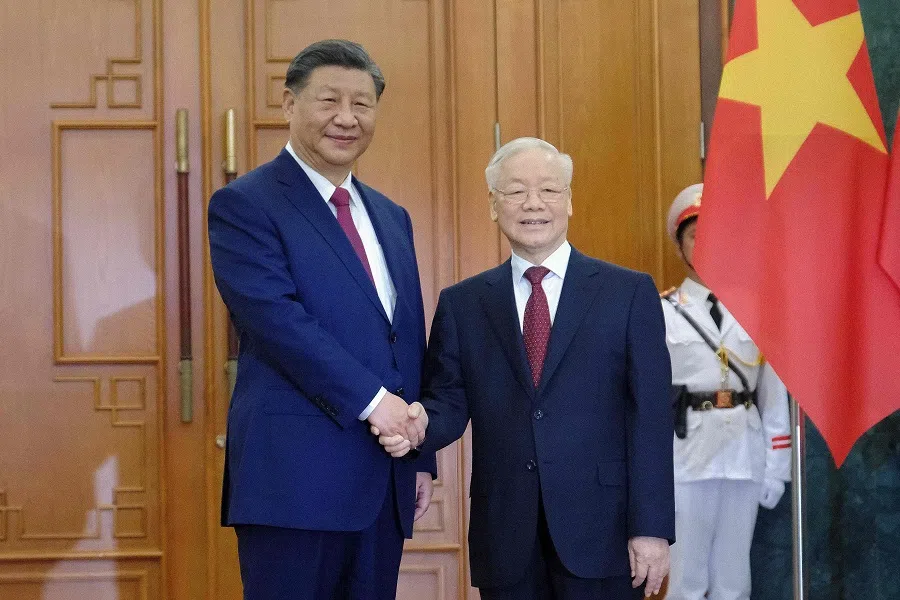
Some international media outlets called this "one community, different interpretations". Such a nuance aptly reflects Vietnam's increasingly adept skill at diplomacy in recent years, and its soft handling of China and the US, allowing Vietnam to benefit from both sides even amid geopolitical conflict.
Firm yet flexible
Being caught between two competing two countries has not been detrimental, but beneficial to Vietnam. This is due to Vietnam's "bamboo diplomacy", which was first proposed by Communist Party of Vietnam (CPV) General Secretary Nguyen Phu Trong in August 2016. The idea was to adopt a diplomatic style that is like the bamboo, firm yet able to sway flexibly when caught in the winds.
In 2015, Trong became the first ever general secretary of the CPV to visit the US. When the China-US trade war started in 2018, and the global supply chain underwent restructuring, Vietnam capitalised on its geographical location and low labour cost, taking over much of the manufacturing orders that moved out from China. After Biden took office in 2021, Vietnam became an even more important partner in the US's "friendshoring" policy. In 2022, Vietnam's economic growth hit 8.02%, the highest in 25 years.
From the US's perspective, since Vietnam is locked in a territorial dispute with China over the South China Sea, it is on the same page as the US in terms of counterbalancing China. The US deems Vietnam an important country to pursue, and high-level meetings between the US and Vietnam have also become more frequent.
This includes US Vice-President Kamala Harris's and US trade representative Katherine Tai's trips to Vietnam in August 2021 and February this year respectively; Biden's phone call with Trong in March; US Secretary of State Antony Blinken's trip to Vietnam in April; and Biden's trip to Vietnam in September, which positioned Vietnam as an important partner in semiconductor cooperation.
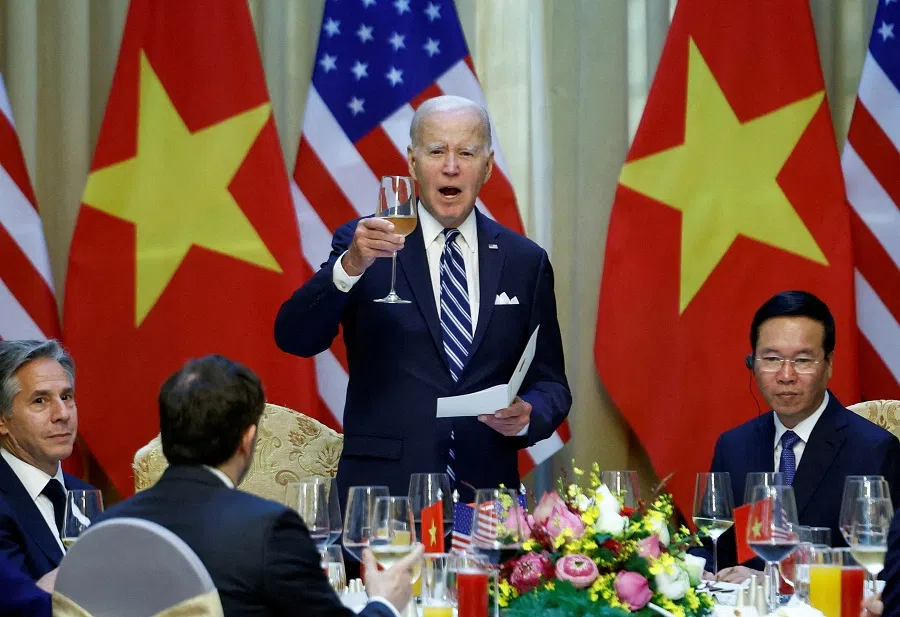
But Vietnam has not been negligent in managing its political and economic relations with China either. Last October, Trong became the first foreign leader to visit China after the Chinese Communist Party's 20th Party Congress. It was also the first time China received a foreign leader since the three-year pandemic.
In fact, since 2015, the top leaders of China and Vietnam have made three rounds of mutual visits to each other's countries - one, Trong's visit to China in April 2015 and Xi's reciprocal visit in November that same year; two, Trong's visit to China in January 2017 and Xi's visit to Vietnam later in November; and three, Trong's visit to China last October and Xi's most recent trip to Vietnam this month. Vietnam Prime Minister Pham Minh Chinh also visited China in June this year.
Vietnam's deft diplomacy, which includes adopting strategic assurances in pursuit of its own security rather than focusing on containment measures alone, is actually worthy of analysis and reference by other parties.
No one will give up on China
In its public rhetoric, Vietnam has also directly stressed that the country considers developing its relations with China "an objective requirement, a strategic choice and a top priority in its foreign policy". Some Chinese academics believe that as Vietnam still positions itself as a socialist country, its "camaraderie plus brotherhood" bond with China forms the basis of the country's diplomacy.
Vietnam academic Khang Vu offered a different interpretation in a commentary in The Diplomat: Vietnam is repeatedly assuring China by stressing its shared socialist ideology to ease tensions with China. And Vietnam is already very experienced in doing so.
When Vietnam-China relations intensified in 2014 (when China moved the HD-981 oil rig into Vietnamese waters) as well as in 2017 and 2018 over maritime disputes, Vietnam relied on its shared ideology to assure China. Khang Vu believes that although Vietnam's "community of common destiny" will not prevent a future China-Vietnam war, it will be enough for both countries to manage their differences to avoid a total breakdown of relationship as in 1978.
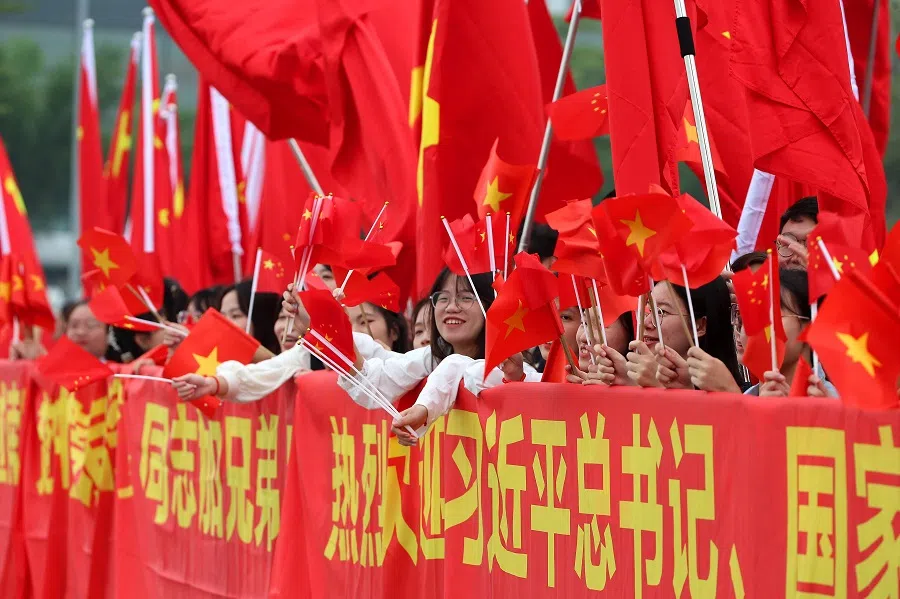
Khang Vu's commentary aims to explain that Vietnam and China's upgrading of ties does not imply that Vietnam has joined the anti-US camp. This is in fact obvious.
Amid an increasingly complex geopolitical landscape, it is natural for Vietnam to cultivate its relations with the US and other major powers while ambiguously leaning towards its large neighbouring countries at the same time. Vietnam's deft diplomacy, which includes adopting strategic assurances in pursuit of its own security rather than focusing on containment measures alone, is actually worthy of analysis and reference by other parties.
Vietnam will be able to gain some practical benefits by deepening its cooperation with China as well. For example, China would be able to provide more direct help to Vietnam in railway construction. At the same time, the White House could change hands after 2024, and former US President Donald Trump, who favours isolationism, could take office again. Against such an important background, no one will easily give up on cultivating its relations with China.
This article was first published in Lianhe Zaobao as "越南在美中竞争中左右逢源".
